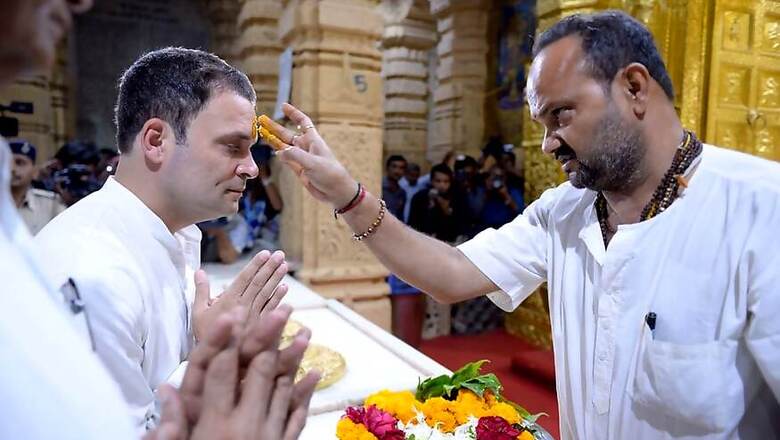
views
For Mahatma Gandhi, politics bereft of religion was "absolute dirt, ever to be shunned". High religious credentials helped Gandhi tide over allegations of bias by the Hindu right. He was both a staunch Hindu and a secular.
If politics is about managing contradictions, this balancing act—especially when tempers ran high—was a master class. Gandhi's Hinduism touched upon the very tenets of the religion. It was about penance, paap and punya. It was about redeeming oneself from the sins of the past in preparation for a life after death. Gandhi the politician could delineate religion from customs. The latter are mere societal norms—malleable and transitory. Religion is something more fundamental to one's identity and faith.
Gauna for instance—the consummation of marriage in North India—is a custom. Abstinence in search of moksha, on the other hand, is a canon intrinsically linked to Hinduism.
In the last few months, votaries of secular politics have attempted to show they are also good Hindus.
Mamata Banerjee government ahead of panchayat polls has decided to distribute cows to enhance milk-production. Delhi chief minister Arvind Kejriwal is promising free pilgrimage to Badrinath, Kedarnath, Mathura and Haridwar. Akhilesh Yadav will soon unveil a 50-feet bronze statue of Krishna at Saifai. And Rahul Gandhi is continuing with his temple run in poll-bound Gujarat and elsewhere.
An entry in a register at Somnath Temple forced the Grand Old Party to go on a damage control overdrive. Party spokesperson released sepia images to reaffirm that Congress vice-president is a 'janeu-dhari Hindu'.
Use of religion is politics—especially for a centrist party like the Congress—is a tightrope walk. Rahul's father tried doing that in the 80s to balance Shah Bano by opening locks of the Babri Masjid. He started his 1989 campaign from Ayodhya with a call to usher in Ram Rajya.
The result was BJP walked away with Hindu votes, Mulayam and Lalu mobilised minorities, inflicting irreparable damage to the Congress. The 1971 victory over Pakistan helped Indira Gandhi shore up strong nationalist credentials. The real challenge for her, however, was never from the Hindu right. All her active political career, senior Mrs. Gandhi battled socialists attempting to wean away a chuck of Congress' Muslim vote bank. Hemwanti Nandan Bahuguna—the progenitor of iftaar politics in India who spoke nafees-urdu—and challenged Congress in Allahabad.
Indira Gandhi made concerted attempts to protect her territory. Apart from other things, she made India a secular and socialist republic during Emergency. But she carried the political finesse to draw Lakshaman Rekha. Which is why even the face of Emergency backlash, Ahmed Patel could win a direct elections from Bharuch in South Gujarat in 1977.
But in the last century, none, not even the ardent and overt votaries of right-wing Hindu politics, could hold sway over the masses as Mahatma Gandhi did.
Gandhi's success perhaps lay in his sharp understanding of religion and its fundamental tenets. His use of symbolism in politics was unparalleled. At the same time, the larger leitmotif remained firmly anchored to the canons of religion and not tradition.
Rahul would do well to understand Gandhi's skillful use of religion in public life if he were to indeed make it part of his political repertoire.




















Comments
0 comment